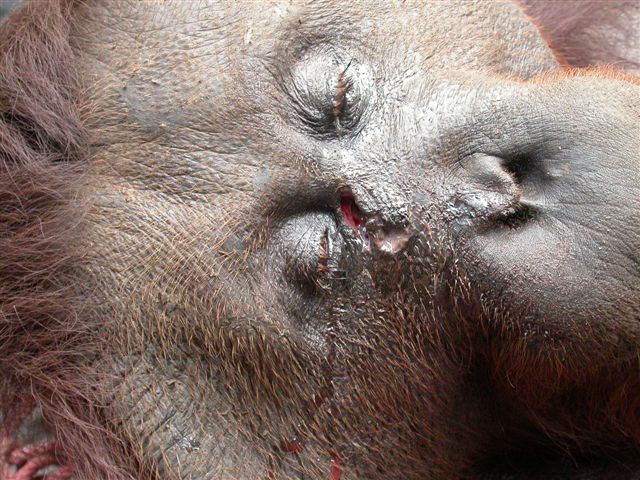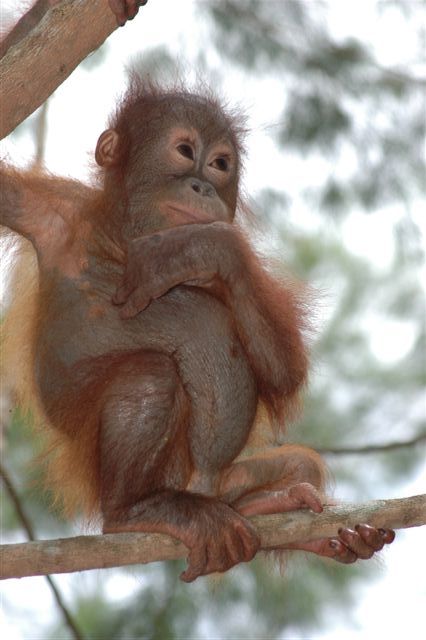 I was just a normal, everyday mother of three living a good life in Australia, minding my own business, when a public tragedy occurred that changed my perspective. The famous Crocodile Hunter and passionate conservationist, Steve Irwin, died suddenly in a stingray barb accident. Reeling from news of his death, I decided that more ‘little people’ like myself needed to take environmental action in order to fill his big shoes.
I was just a normal, everyday mother of three living a good life in Australia, minding my own business, when a public tragedy occurred that changed my perspective. The famous Crocodile Hunter and passionate conservationist, Steve Irwin, died suddenly in a stingray barb accident. Reeling from news of his death, I decided that more ‘little people’ like myself needed to take environmental action in order to fill his big shoes.
I decided to concentrate on orangutans because if we can’t prevent the extinction of the great apes, what hope do we have of saving any creature? I learned that the development of palm oil plantations is the single greatest threat to the survival of the wild orangutan. These plantations not only take over their homes, but orangutans are killed when they wander, displaced and starving, onto the plantations looking for food.
There is already much deforested and idle land in Indonesia where palm oil could be grown but companies choose to continue logging and reaping the immediate profits from the sale of the timber. These companies are usually owned by rich multi-nationals from Malaysia and China.
Incredible animals like the Sumatran tiger, Sumatran rhino, clouded leopard, Asian elephant, sun bear, gibbon and many species of primates live in these forests. They are not taken into care when their forest homes are logged and then burnt to the ground; they are killed and eaten or sold into the pet trade or used in Asian medicines.
 I was shocked and outraged and determined not to purchase or consume any more palm oil. I went to my supermarket intent on reading labels and choosing alternative vegetable oils. And then I discovered that palm oil was labeled under the umbrella of “vegetable oil†and that there was no easy way of identifying this ingredient. Frustrated, I decided to take the professional approach; I made a formal application to the Food Standards Australia New Zealand (FSANZ) to label palm oil.
I was shocked and outraged and determined not to purchase or consume any more palm oil. I went to my supermarket intent on reading labels and choosing alternative vegetable oils. And then I discovered that palm oil was labeled under the umbrella of “vegetable oil†and that there was no easy way of identifying this ingredient. Frustrated, I decided to take the professional approach; I made a formal application to the Food Standards Australia New Zealand (FSANZ) to label palm oil.
In March 2008, eighteen months later, the FSANZ Board met and reviewed my application. Their preliminary opinion, subject to my response, was to reject my application on the grounds that it did not fall within the scope of the FSANZ’s legislative capabilities. Using the domestic market to regulate international environmental affairs was not their job. Also, my application was not relevant to public health issues and this is the main domain of the FSANZ.
In my response to the FSANZ, I have pointed out that in 2000 they saw fit to label genetically modified food (GM food) while taking pains to reassure the public that there were no safety concerns. I have also argued that palm oil is high in saturated fat which is very unhealthy and that the public has a right to try to avoid it. I have argued that the nutritional information panel (NIP), which is mandatory for food in Australia and New Zealand, is inadequate for informing the public about their saturated fat intake because it requires them to add up every gram of fat in their diet. It would be much easier to simply avoid palm oil.
I am also writing letters to the Australian Federal government asking them to expand the FSANZ Act to include ethical and environmental concerns. With the reality of climate change upon us, I believe that every government needs to reform legislation to recognise environmental priorities and accomodate urgent environmental needs. There will be a need to label foods or products that contribute significantly to climate change to enable the public to take responsibility and affect supply through reduced demand.
 I am a member of the Palm Oil Action Group (POAG), which is a coalition of non governmental organisations (NGO’s) in Australia who have banded together for a common aim, to find solutions to the palm oil issues. Every NGO in this group has written a letter to FSANZ in support of my application to label palm oil. The POAG’s website is: www.palmoilaction.org.au
I am a member of the Palm Oil Action Group (POAG), which is a coalition of non governmental organisations (NGO’s) in Australia who have banded together for a common aim, to find solutions to the palm oil issues. Every NGO in this group has written a letter to FSANZ in support of my application to label palm oil. The POAG’s website is: www.palmoilaction.org.au
I would encourage every concerned individual to write to their government and Food Standards Body and request that environmental laws be strengthened and palm oil be labeled. I would be especially grateful if Australian and New Zealand citizens wrote to FSANZ and governments asking for the labeling of palm oil.
With palm oil labeling, a level of transparency will be introduced to the market which will give consumers the opportunity to use their purchasing power to influence the practices of these multinational companies. It is my hope that the conscious consumer can play an integral part in finding a solution to the tragedy that is unfolding in South East Asia. We need to do everything we can to save the magic of our rainforest biodiversity, combat deforestation-driven climate change and save ourselves from ourselves.